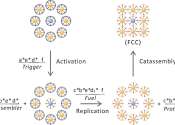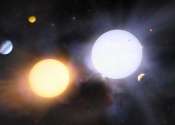System (from Latin systēma, in turn from Greek σύστημα systēma) is a set of interacting or interdependent entities forming an integrated whole.
The concept of an 'integrated whole' can also be stated in terms of a system embodying a set of relationships which are differentiated from relationships of the set to other elements, and from relationships between an element of the set and elements not a part of the relational regime.
The scientific research field which is engaged in the study of the general properties of systems include systems theory, systems science, systemics and systems engineering. They investigate the abstract properties of the matter and organization, searching concepts and principles which are independent of the specific domain, substance, type, or temporal scales of existence.
Most systems share common characteristics, including:
The term system may also refer to a set of rules that governs behavior or structure.









